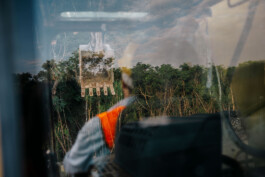
In Mexico, the largest transport infrastructure project in Latin America is scheduled for completion at the end of 2023. The government of President Andres Manuel Lopez Obrador plans to connect the economically isolated, indigenous south of the Yucatán Peninsula with the tourist centres of Cancún, Tulum and Playa del Carmen by means of an extensive railway line, the „Trén Maya“. The route runs through an area which, next to the Amazon, is Latin America‘s second most important „green lung“ and extends over 4 million hectares (40,000 km2) of land. In the middle of this primeval forest, a cutting has been made, about 100 m wide and about 1500 km long.
According to commercials on the Youtube channel of the Mexican president, the latest technology of the
and the Spanish RENFE railway, the Trén Maya is supposed to promote sustainable tourism and strengthen jobs and infrastructure in the poorest regions of Mexico in order to improve the quality of life of the mostly indigenous population. In this project, the Mexican president has overridden all the concerns of numerous NGOs and environmentalists, whom he considers incompetent and corrupt.
For the Mexican president, the stakes are high, as companies from all over the world are involved in the project and if it fails, the current government would face a shambles. However, environmental organisations and civil society are sounding the alarm. They fear that the supposedly sustainable project will destroy areas the size of Saarland in the globally unique Petén rainforest. Also organisations of the Mayan peoples in the region have also vetoed the project. According to estimates by the Consejo Indigena Nacional, an association of the indigenous peoples, and other NGOs, 9 million trees have already been cut down. The natural paths of the jaguar and
of many other wild animals are being interrupted here, with no regard for the fact that they belong to
endangered species. A spokesperson for the project nevertheless stresses the environmental friendliness of the project, claiming that although trees are being felled, many times that amount would
be reforested elsewhere.
The revolutionary Zapatistas (EZLN) have also announced resistance. Romel González Díaz is an indigenous lawyer and calls the project a „colonisation project of the capital“. International organisations criticise the insufficient participation/involvement of the indigenous population




































In Mexico, the largest transport infrastructure project in Latin America is scheduled for completion at the end of 2023. The government of President Andres Manuel Lopez Obrador plans to connect the economically isolated, indigenous south of the Yucatán Peninsula with the tourist centres of Cancún, Tulum and Playa del Carmen by means of an extensive railway line, the „Trén Maya“. The route runs through an area which, next to the Amazon, is Latin America‘s second most important „green lung“ and extends over 4 million hectares (40,000 km2) of land. In the middle of this primeval forest, a cutting has been made, about 100 m wide and about 1500 km long.
According to commercials on the Youtube channel of the Mexican president, the latest technology of the
and the Spanish RENFE railway, the Trén Maya is supposed to promote sustainable tourism and strengthen jobs and infrastructure in the poorest regions of Mexico in order to improve the quality of life of the mostly indigenous population. In this project, the Mexican president has overridden all the concerns of numerous NGOs and environmentalists, whom he considers incompetent and corrupt.
For the Mexican president, the stakes are high, as companies from all over the world are involved in the project and if it fails, the current government would face a shambles. However, environmental organisations and civil society are sounding the alarm. They fear that the supposedly sustainable project will destroy areas the size of Saarland in the globally unique Petén rainforest. Also organisations of the Mayan peoples in the region have also vetoed the project. According to estimates by the Consejo Indigena Nacional, an association of the indigenous peoples, and other NGOs, 9 million trees have already been cut down. The natural paths of the jaguar and
of many other wild animals are being interrupted here, with no regard for the fact that they belong to
endangered species. A spokesperson for the project nevertheless stresses the environmental friendliness of the project, claiming that although trees are being felled, many times that amount would
be reforested elsewhere.
The revolutionary Zapatistas (EZLN) have also announced resistance. Romel González Díaz is an indigenous lawyer and calls the project a „colonisation project of the capital“. International organisations criticise the insufficient participation/involvement of the indigenous population



































+49 176 57983440
info@axeljaviersulzbacher.com
© 2025, Axel Javier Sulzbacher Impressum | Datenschutz
Gestaltung: Bureau Sebastian Moock
+49 176 57983440
info@axeljaviersulzbacher.com
© 2025, Axel Javier Sulzbacher
Impressum | Datenschutz
Gestaltung:
Bureau Sebastian Moock